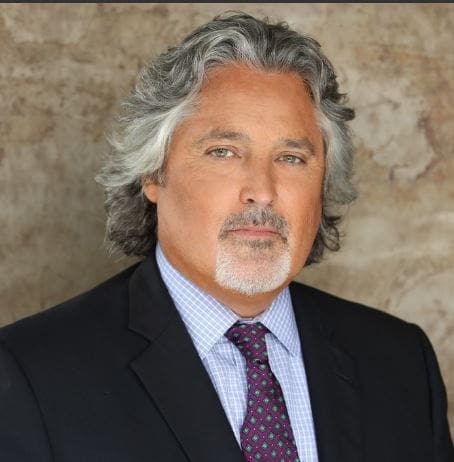Attorney Mark Peacock, Owner of the Law Offices of Mark Peacock, in this interview tells Jean Gonzalez, President of South Coast College, how important a paralegal is to a law office. He goes on to say that Christine Mantyla, Paralegal, graduate of South Coast College, transformed his law office and that South Coast College is indirectly or directly responsible for this transformation.

Law Offices of Mark Peacock
Q Would you tell me a little bit about what your law firm does?
A My law office is called Law Offices of Mark Peacock. Our law office deals with safety issues. By safety, I mean first responders — law enforcement, fire, paramedics, and so on. We specialize in civil matters — personal injury, accidents — regarding safety personnel in the line of duty. Our client base is the entire state of California from the border of Mexico to the border of Oregon.
Q What would a paralegal who works for you do in a typical day?
A In general, a paralegal spends a great deal of time in client interaction. For example, if an automobile accident claim were involved, the paralegal first must acquire an appreciation for what the client has endured. It means listening to the client and gathering the evidence to help the client present his or her claim.
An accident will involve numerous medical records. Obtaining the medical records involves a complex process of dealing with health providers. The paralegal needs to be able to not only order the records but understand what they mean to the client to understand the nature of the client’s claim. Getting to know the client involves many phone calls with the clients and people who know the clients: employers, business associates, relatives, and so on. The paralegal needs to have a lot of background information to be able to begin to formulate a claim on behalf of the client.
As you can see, the process is document intensive. The other aspect is the litigation part itself. The paralegal is involved in everything from drafting complaints to conducting discovery. The discovery process — uncovering the facts in the case — involves preparing interrogatories or questions to be sent out to be answered by parties associated with the case. Basically, the paralegal is involved in all types of document preparation to discover what the position of the opposing side is on a particular claim. That task in and of itself involves an enormous amount of work. It’s an enormous amount of work, but it is vital to the case. Cases do not move forward to conclusion without those things being done. The paralegal must be thoroughly engaged in the process.
Q What are the three most important qualities you look for when hiring a paralegal?
A Honesty, trustworthiness, and dedication.
When I interview people for a job, I want to get a sense of where they’ve come from and what kind of work ethic or values that they bring to the table. The other quality is the willingness to go above and beyond that which is being asked. In other words, being a team player and being self-motivated.
If I ask a paralegal to generate a document, I am really asking the paralegal to go beyond the mere act of document production. I am asking the paralegal to take ownership of the task and understand that what they are really about is helping people. It goes beyond document production. It is about becoming engaged with the client in the case.
Q How important is a paralegal to the functioning of your law office?
A There’s no law office without the paralegal.
The paralegal in most cases — and I mean no disrespect to anybody – is more important than the lawyer because the paralegal is in complete and utter control of the law office. The paralegal is juggling client contacts, organizing everything, and keeping everything running efficiently. You just can’t function without someone like that in a law office.
Twenty years ago, a firm expanding its services would be interested in hiring lawyers. From the perspective of someone growing a law firm today as I am currently doing, my next hires are paralegals.
Q In line with that, the Bureau of Labor Statistics indicates that there will be a demand for paralegals in the next decade, and I was going to ask you if you had any insight into why this might be true, or why it might not be true?
A From my perspective, and it’s just mine, it’s a cost issue. When you have a law firm, you must look at the people that you hire in terms of how they will affect the bottom line. You must decide who is best prepared to bring the most to the bottom line. Paralegals who are trained well are often in a better position to affect the bottom line positively than someone right out of law school.
Employers look at a prospective employee and want to know whether the employee is going to make money for the firm, cause the firm to break even, or cost the firm money. If you add a new lawyer, you want the lawyer to be making money for the firm or at least breaking even. In the process of expanding a firm, the attorney must ask the question: Which employee will be the best choice to affect the bottom line positively – the paralegal or the lawyer?
Q A representative from a paralegal association just recently visited our school, and she said that nationwide there’s a decrease of students entering the paralegal programs. Do you have any insight as to maybe why this is the case?
A I would think that it would be the other way around.
I don’t know why that would be. Let me tell you why. In the past, the legal secretary was basically a paralegal. The legal secretary did everything. That model has begun to disappear, and it’s being replaced by paralegals — who in a perfect paralegal world would be able to do all the things that that legal secretary did in the past but with a more in-depth legal knowledge.
So you would expect that the prospective students thinking about working in an entry-level capacity in the legal field would naturally want to be paralegals. The term that is used to describe this position is not as important to me as what the person actually can contribute to the office. I have an employee in my office who is not as yet a paralegal, but who is working with us doing office work. I have encouraged her to go to South Coast College to continue to grow in her legal knowledge. The more that she knows, the better she will be able to assist in helping the clients and helping the firm.
Now, I was a little surprised by what you stated earlier. I would think that paralegal enrollment would be on the rise, not the other way around.
Q You have employed graduates from the Paralegal Program at South Coast College and periodically inquire about hiring others. What in particular is the reason you seek out South Coast College graduates?
A Because of the quality of the candidates. Christine Mantyla, a graduate of South Coast College, who is employed as a Paralegal at our law firm is a great example. She has transformed my law firm. The training that she received from South Coast College together with her passion for working with clients and her work ethic has literally transformed my law firm. My family, my clients, and I are indebted to her. So directly or indirectly South Coast College has helped transform my law firm. There’s no question about that.
Q That’s great to hear.
A That’s the truth.
The End
A special thanks to Attorney Mark Peacock for taking the time to engage in this interview and for his insights into the role of the paralegal.


